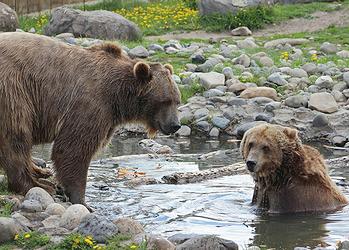
MISSOULA, Montana, August 31, 2018 (ENS) – A federal judge Thursday granted a temporary restraining order stopping Wyoming and Idaho’s planned grizzly hunt that was set to start September 1. The order grants the bears a reprieve while the judge decides whether the federal government should reinstate federal protections for the bears.
The public interest environmental law firm Earthjustice filed the temporary restraining order Thursday on behalf of the Northern Cheyenne Tribe, the Sierra Club, the Center for Biological Diversity and the National Parks Conservation Association.

“As we explained to the judge today, the removal of protections for Yellowstone’s iconic grizzlies was illegal. The bears should not be killed in a hunting season made possible by an illegal government decision,” said Tim Preso, Earthjustice attorney.
In the order, the Judge Dana Christensen wrote that the impending hunt would cause irreparable harm to grizzly bears “because once a member of an endangered species has been injured, the task of preserving that species becomes all the more difficult.”
Judge Christensen heard oral argument on the challenge to the federal government’s 2017 decision to remove federal Endangered Species Act protections from a segment of the lower-48 grizzly population that occupies habitat in the Greater Yellowstone Ecosystem.
In August 2017, the U.S. Fish and Wildlife Service removed the Yellowstone-region grizzly bear population from the federal endangered and threatened species list, even though the area’s grizzly population has suffered high levels of human-caused deaths in recent years.
This fall, for the first time in more than 40 years, the states of Wyoming and Idaho announced grizzly hunts that would allow for up to 23 bears to be killed outside of Yellowstone National Park.
The Northern Cheyenne Tribe and conservation groups challenged the Fish and Wildlife Service’s disregard of bear deaths following the bears’ recent shift to a more heavily meat-based diet following the loss of other foods.
The tribe and groups also faulted the Service for carving out and delisting the isolated Yellowstone grizzly population instead of focusing on a broader, more durable grizzly recovery in the West.
They challenged the Service’s decision to disallow public input on changes to its management framework for grizzlies, which weakened protections.
The judge ruled that, “…in Endangered Species Act (“ESA”) cases, the Court “presume[ s] that remedies at law are inadequate, that the balance of interests weighs in favor of protecting endangered species, and that the public interest would not be disserved by an injunction.”
“Thus, here the Plaintiffs must demonstrate only that irreparable harm is likely and that they are likely to succeed on the merits.
Judge Christensen wrote, “In light of the stated purposes of the ESA in conserving endangered and threatened species and the ecosystems that support them, establishing irreparable injury should not be an onerous task for plaintiffs. Here, the threat of death to individual grizzly bears posed by the scheduled hunt is sufficient.”
Copyright Environment News Service (ENS) 2018. All rights reserved.
© 2018, Environment News Service. All rights reserved. Content may be quoted only with proper attribution and a direct link to the original article. Full reproduction is prohibited.
